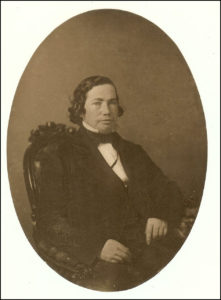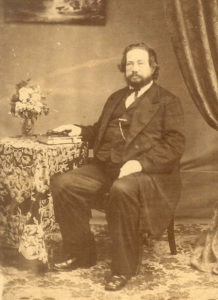Broadus on Boyce: ‘a Christian gentleman’
EDITOR’S NOTE: Tomorrow, Dec. 28, marks the 125th anniversary of the death of James P. Boyce, Southern Baptist statesmen and the founding president of The Southern Baptist Theological Seminary. At Boyce’s funeral, fellow seminary founder and close friend John A. Broadus described Boyce’s character. The following is a portion of Broadus’ comments selected by Gregory…
EDITOR’S NOTE: Tomorrow, Dec. 28, marks the 125th anniversary of the death of James P. Boyce, Southern Baptist statesmen and the founding president of The Southern Baptist Theological Seminary. At Boyce’s funeral, fellow seminary founder and close friend John A. Broadus described Boyce’s character. The following is a portion of Broadus’ comments selected by Gregory A. Wills, dean of the School of Theology and professor of church history at the seminary, for his introduction to a new edition of Boyce’s Abstract of Systematic Theology (available at the Lifeway campus store at SBTS). In honor of Boyce, we reproduce Broadus’ comment below, because, as Wills writes, “A man’s character does not prove the truth of his religious convictions, but it necessarily reflects them.”
 If I were to talk to you for hours and tell you of all he went through you could but half conceive it. I do not think the strongest type of character is the man who stands unmoved amid difficulties and trials, but he who does feel, and feels keenly and deeply, feels depressed and at times almost overwhelmed, and still does not give up. And such was the history in this case. Many times it seemed impossible to go on, and but for his heroic efforts the seminary would have been closed. That was what wore out this life ten years too soon, that long, sore, terrible struggle. He had lost by the war the greater part of his fortune. He had many opportunities to recover it with his wonderful business talents, and they were often pressed upon his acceptance, but he had made up his mind that, God helping him, this enterprise to which he had given his life should not fail; and blessed be God, before he died he knew that although it was not yet fully established and its wants met, yet it had before it a glorious future. Friends, you do not know the future he dreamed for it, and the future I believe is coming, if those to whom he looked rally around it as I trust they will do now. It will have a future compared with which anything you have seen will seem little. I speak not of the plans of an idle dreamer, but of a great projecting mind who knew whereof he thought and hoped. …
If I were to talk to you for hours and tell you of all he went through you could but half conceive it. I do not think the strongest type of character is the man who stands unmoved amid difficulties and trials, but he who does feel, and feels keenly and deeply, feels depressed and at times almost overwhelmed, and still does not give up. And such was the history in this case. Many times it seemed impossible to go on, and but for his heroic efforts the seminary would have been closed. That was what wore out this life ten years too soon, that long, sore, terrible struggle. He had lost by the war the greater part of his fortune. He had many opportunities to recover it with his wonderful business talents, and they were often pressed upon his acceptance, but he had made up his mind that, God helping him, this enterprise to which he had given his life should not fail; and blessed be God, before he died he knew that although it was not yet fully established and its wants met, yet it had before it a glorious future. Friends, you do not know the future he dreamed for it, and the future I believe is coming, if those to whom he looked rally around it as I trust they will do now. It will have a future compared with which anything you have seen will seem little. I speak not of the plans of an idle dreamer, but of a great projecting mind who knew whereof he thought and hoped. …
James P. Boyce was a genuine man, … made out of good timber all the way through. Who ever found a flaw in his make-up? That is a very strong statement. That is surely the very highest character a man can have in this world, to be thoroughly genuine all the way through. And I bear that testimony personally as one who knew him better than I knew my own brother. …
What an adviser he was. Ah, there were so many occasions when no counsel but his would do, and that cannot be had anymore. He had great knowledge of character, great insight. I thought he was prejudiced sometimes, as everyone is likely to be, but oftener than otherwise, it would turn out that he was right, for good or ill.
He was a man of very strong convictions, and very decided opinions, and immense tenacity of purpose, a man who knew why he thought a thing was right and knew why he was determined to do something; and yet it was never impossible to convince him that he was wrong. It was not easy, but it was never impossible. There was no pride of pertinacity, no reluctance at all to listen to opposing opinions and weigh the argument; but strong in conviction, decided in opinion and tenacious of purpose because he saw good reason for it, and as long as he saw no sufficient reason to the contrary
He was a man utterly regardless of personal considerations, where he was sure he was doing right, and ever willing to wait for a better judgment if he be misjudged. And yet he was surpassingly considerate of other people’s wishes and opinions.
In the highest and broadest sense of that term our friend was a generous man. His whole view of mankind had something generous about it. He liked to think well of people if he could. He was always glad to give other people with whom he was associated the amplest meed of commendation for their joint work. If he was ever extravagant in language it was when he praised his friends. In the ordinary sense of generosity, nobody can ever tell, as has been already said, in how many beautifully delicate ways he manifested it. …
He was a man of honor. … He was a Christian gentleman. That ought to be the highest style of man. I never saw him impatient about anything except where  someone had been ungentlemanly in speech or action; he could not bear it.
someone had been ungentlemanly in speech or action; he could not bear it.
He was a very deep and strong thinker. People who knew him in business and saw what a knowledge of business he possessed could hardly be persuaded that he was a great student or thinker; and yet I never knew a man who combined those two each in so high a degree. …
He was a man of remarkable general attainments. His reading in politics was very wide, and his ideas of political questions came out in conversation sometimes in a way to startle men who had devoted their lives to such subjects. I never knew a man who had read so much of recent poetry as he had, and it was a mark of his talent that a man so engrossed in other things should take so much delight in poetry. He was rich in his make-up, exhibiting a love of art in every way. He would stand entranced before a beautiful picture.
Any historical record of the founders of the Southern Baptist Convention, and The Southern Baptist Theological Seminary, is incomplete without an honest telling of their complicity in American slavery and racism. For more on that story, read here.


